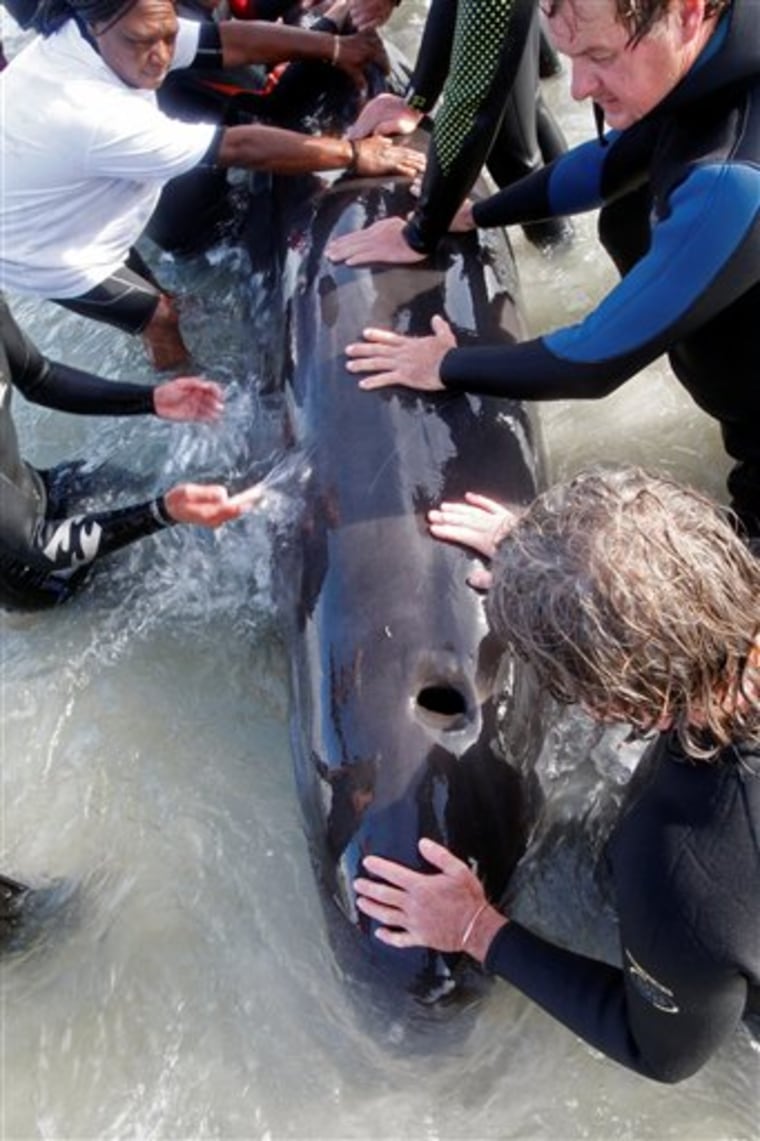Authorities shot dozens of exhausted whales that beached on a shore near South Africa's storm-lashed southern tip Saturday amid scenes of grief and despair from volunteers who had tried to save them.
Fifty-five false killer whales washed up on the shores of Kommitjie, near the Cape of Good Hope, in the early morning, prompting a massive all-day rescue effort. Hundreds of locals wearing wet suits or shorts braved high winds and rough waves to try to push the massive mammals from knee-deep water back into the open sea.
To no avail.
"I feel quite sad, but it is the right thing to do," Nan Rice, head of the Dolphin Action and Protection Group, told the South African Press Association.
"They are huge animals and are stranded over a vast area. Unfortunately they (the volunteers) couldn't do it."
One woman suffered suspected fractured ribs after being pinned between a whale and rocks. A number of volunteers had to be rescued from the surf while trying to swim the whales beyond the breaking waves, according to Ian Klopper of the National Sea Rescue Institute.
Cape Town authorities mobilized the police, fire brigade, navy, lifeboat services, disaster management teams and expert divers as part of the rescue operation. They brought in six bulldozers to try to move the whales, which were about 10 feet long, back to sea. But the whales — part of the dolphin family — kept swimming back to shore and became increasingly stressed.
Plans to transport the whales by road to the nearby deep-water naval base in Simons Town were shelved when it was decided that their health had deteriorated too much.
Scientists then decided there was no alternative but to kill about 35 whales to prevent further suffering. A further 10 died of stress. And it was feared that the whales that did manage to escape were too exhausted to survive, according to Klopper.
"The most humane way to perform euthanasia on whales is to shoot them through the brain, and this was successfully performed on those whales suffering on the beach. We wish to stress emphatically that the most humane effort was employed to prevent further suffering of these animals," he said.
Television footage of the scenes on the desolate beach was interspersed by the sound of gunshots. "One shot, one whale. Another shot, another whale," said the commentator.
The bulldozers brought in to push the whales out to sea were used to clear the carcasses from the seaweed-strewn sand.
Police desperately tried to clear the beach of dozens of families who had flocked to the shores in hope of a happy ending which turned nightmarish. There were also minor scuffles between officials and distraught volunteers trying to protect the whales.
Klopper said authorities were urging those who had young children there to seek trauma counseling.
"Despite many theories on why marine animals beach it has not been determined what caused these whales to beach today," he said.
The South African coast is renowned for its whale watching during the winter season, which is in progress. But mass beachings are rare.
